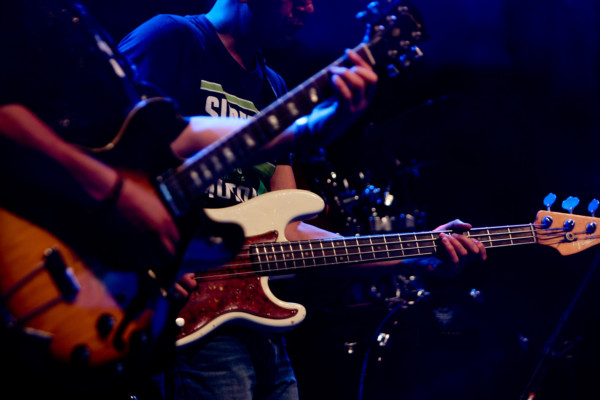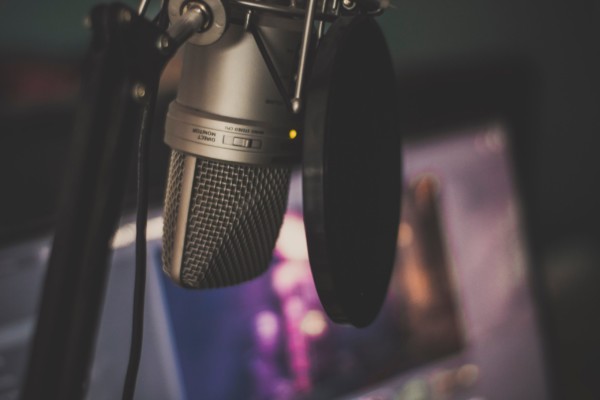Performing Live: Adapting to Your Environment

Q: I had a gig last night at a church and the room resonated right on F#. The designer of the church could not have designed it any better to mess up anybody playing F#. When I would hit an F#, it would instantly double or almost triple my output. Very crazy. I tried to remember to play it lighter when hitting the note, but I couldn’t always remember to do so. It affected mostly the lower two F#’s but the upper ones were also boosted by the room. A lot of our songs are in D and that F# kept catching me on transitions when I reached for a major third of the I chord to transition to the IV chord. How do other players handle situations like this when the room resonates on a certain note?
A: There may well be a sound-designer out there who can help us with this one (if so, please share in the comments below). As a player, here are my thoughts.
My first thought is the front of house sound guy. Assuming that someone is running sound, there may be something they can do in the mix to alter the way that frequency is reacting with the room. This may mean that you need to turn way down on stage and let him handle the bass sound in the room.
If there is no sound guy, or he or she can’t seem to help, you might try experimenting with your own EQ on stage, or even lifting the amp off of the floor. It’s possible that the bass was traveling through the stage (especially if it’s a hollow stage) and resonating up through the vocal mics. Lifting the cab off of the floor can sometimes fix this problem immediately.
If you try that, as well as tweaking your EQ, and nothing helps, then we are left a little bit between a rock and a hard place, and we’re faced with some tough (and not so tough) choices:
- Turn way down on stage and lose much of the low end for the performance as a whole
- Avoid the F# at all costs (hard to remember but if you can remember to change your lines by, say using an A (5) to transition from D to G instead of the F#, for example, you can at least maintain your presence in the sound of the band and sound the way you want to sound for the night)
- Move your speaker cabinet. You could always set up your cab to face sideways or backwards (but facing you, in front, essentially) so you change the way the bass is bouncing around the room. This may mean, again, that the front of house guy needs to handle the bass out front, but at least you’ll hear yourself the way you like.
- If there’s no sound guy though, this will change the way the band sounds in the room but might, at least, alleviate your issues with that particular frequency. Hopefully.
With a good sound guy, it should be a problem that can be solved in a way that’s not too painful for you as a performer. But some rooms just weren’t meant for amplified music, and there really isn’t all that much that can be done about it.
Readers, what’s your approach to dealing with multiple (and sometimes frustrating) environments? Share your thoughts and stories in the comments.
Have a question for Damian Erskine? Send it to [email protected]. Check out Damian’s instructional books, Right Hand Drive and The Improviser’s Path.




In situations like this I have found that the ONLY real way to eliminate those overpowering frequencies is by moving your amp. Offsetting the angle will often help.Then you won’t forget yourself. It’s almost a form of feedback, where the acoustics just keep reinforcing the frequency. I found one other method that MAY work, but it’s hit or miss. Hanging my coat (granted, a leather jacket) over the front of my amp helped on more than one occasion. It acts as kind of a baffle so the frequency is muted before going bananas. Good luck.
As a Sound Guy and a Bassist I put forth the following.
Before you start to avoid playing the note make sure it’s in the entire room. The design of the corner of the room or the stage area could be creating a standing wave. This is where the sound bouncing off one wall combines in phase with the sound of your amp boosting the intensity. If the rest of the room does not have this wave your altering your playing and the listener will be missing your F# when they don’t need to. Most likely there are also dead notes where the reflections cancel out the sound and you hear very little of the note. Neither one is good to have to deal with.
I played on a stage where the distance between the parallel side walls of the stage matched the wavelength of a G. If I stepped out off the riser to a spot where the walls were no longer parallel the standing wave was no longer an issue. The only true fix is for the Venue owner to change the acoustics of the area. Getting the room analyzed and some bass traps built in the areas were these standing waves are causing issue might be the first step.
As for the ideas presented:
1. Always a great idea. less sound from the stage the more control the sound tech has and the better you’ll sound to the audience.
2. There are always alternates to play. Just staying away from a note that you’ve practiced to play over and over again is hard to do.
3. The idea of moving your amp may not net as much as moving your body. The wavelengths of bass notes are fairly large. To really change the effect your amp has on the room you may need to move it 10′ or more. turning it around will effect the high end or transients but if there is a standing wave it may not make much of a difference. Facing it toward you ears instead of the back of your shins is also a top notch idea. It wont effect the standing way but will allow you to turn down and the wave will be less of an issue.
In His Service,
Karl Freudenreich
Acoustic Butler
Orange Friends Church.
Lewis Center Ohio.
My experience is to add a little (or some more) compression to your sound. Whenever I have to play in a difficult room (out of stone or glass.. or in a church), I switch on my compressor pedal. It doesn’t eliminate the problem, but it definitely helps by making the bass sound (especially the lows) more compact and not so boomy and bouncy. You’re sound will appear thinner, but in the mix it will be alright.
Another thing is: try to play as soft as possible with the whole band!
And: use a (semi) parametric EQ. Try to find out at what frequency it’s the worst and take it out of your sound. Maybe your bass sound won’t sound as you like it, but if you can safe the music and the evening with it, it is worth it.
Well I was playing guitar (nylon, semi-acoustic through PA) with a colleague in the open yesterday, and it was my A on the 6th string going bananas high. I could only think of palm-muting it half a sec after playing the tone. Annoying. It happened to me once also at a Jam, same stuff.
I take a different approach, and usually just run with it. When a note is really live and ringing in a room, I tend to hang around that spot and find every excuse to experiment & incorporate it into what I’m playing. And if I’m not fired after the first couple of songs, the band leader usually tells me to ‘Knock That Sh*t Off!’ :-)
Haha. Love that.
I don’t think there are any great answers to this one. If you have an EQ in your chain, suck out as much of the lowest fundamentals of the note as you can: http://www.phy.mtu.edu/~suits/notefreqs.html In the case of F# I’d probably go for the 100hz slider (close to the first harmonic) since not many people have a 46hz adjuster. :) If you just have Bass, Mid, Treble, roll off the bass and boost the mids. That will help eliminate resonances but keep you “present.” Beyond that, as others have said, move the rig. Put it on a milk crate, or you might even have to swap sides of the stage. Maybe it’s time for somebody to come up with a decent isolation style amp stand that can handle big bass cabs.
F#, eh.. How about play the octave of the resonating note? I often play the octave when I have to play F# just because it has more definition and adds a sort of more melodic aspect to what I’m playing there. Can’t do a whole lot about boomy rooms though. Maybe drop your low mids.
F#, eh.. How about play the octave of the resonating note? I often play the octave when I have to play F# just because it has more definition and adds a sort of more melodic aspect to what I’m playing there. Can’t do a whole lot about boomy rooms though. Maybe drop your low mids.